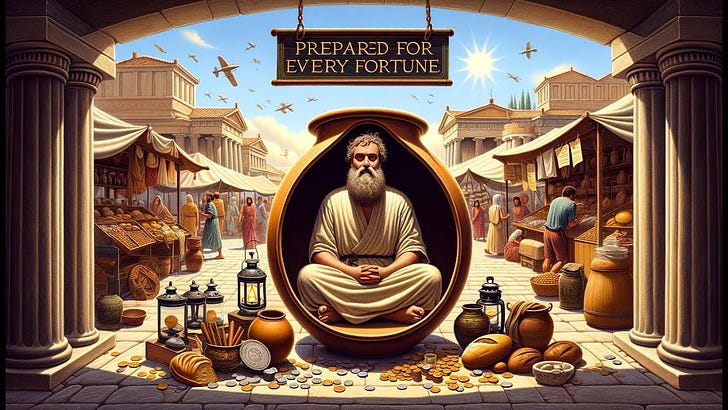I’m currently in the process of making short interesting videos about inspiring philosophers, focusing on one key lesson we can apply to our own lives.
In this second video in the series, we take a look at the legend that is Diogenes the Cynic.
What can we learn from Diogenes?
When queried about the wisdom he had garnered from philosophy, Diogenes responded with succinct profundity: "To be prepared for every fortune." This anecdote, as relayed by William B. Irvine in "A Guide to the Good Life: The Ancient Art of Stoic Joy," encapsulates the essence of Diogenes’ teachings. Diogenes stands as the most illustrious figure among the Cynics, whose philosophies laid the groundwork for Stoicism. His lifestyle and beliefs were marked by their stark contrast to societal norms; he famously made his home in a barrel and eschewed all forms of luxury. Diogenes practiced extreme austerity, partaking in food and drink only when driven by necessity, finding profound satisfaction in the simplest of pleasures, like a mere cup of water, which he savored as though it were the finest wine.
At the heart of Diogenes’ philosophy was the conviction that individuals become slaves to their desires, much like servants to their masters, leading to endless discontent. This observation drove him to master his own desires and detachments, striving for self-sufficiency and contentment in true Stoic fashion.
One of the most vivid episodes that illustrate Diogenes’ embodiment of Stoic principles occurred during his encounter with Alexander the Great. Alexander, educated by Aristotle and a fervent admirer of philosophers, sought out Diogenes, having heard of his extraordinary perspective on life. Their meeting is legendary; Alexander, the most powerful man of his era and known for his fiery temper, offered Diogenes any gift he desired. The philosopher's request was simple yet profound: "Yes," Diogenes said, "stand a little out of my sun."
This response, emblematic of Diogenes’ Stoic virtues, showcased his unwavering commitment to a life of simplicity and independence, even in the face of the world’s most powerful ruler. Astonished and impressed, Alexander declared to his companions, amused yet respectful, "But truly, if I were not Alexander, I would be Diogenes." Through this exchange, Diogenes not only lived his philosophy but seized every opportunity to impart his wisdom, demonstrating the strength and resilience of Stoic ideals.
P.S. I’m working hard behind the scenes on my 10-week live Stoic boot camp. Not much more to share other than if you want to work directly with me and a group of fellow Stoic martial artists of the mind, keep an ear to the ground and/or DM me.





A tip of the hat to you--bravo! an excellent video, clear, beautiful and illuminating.